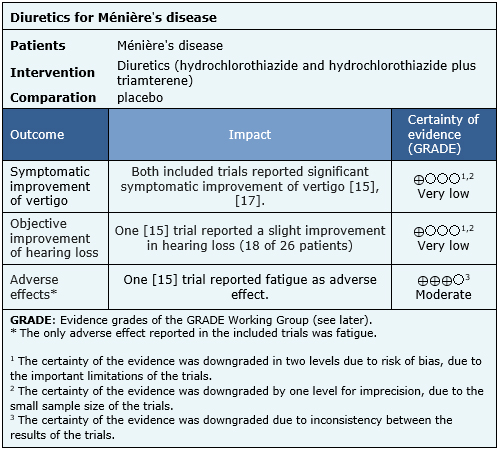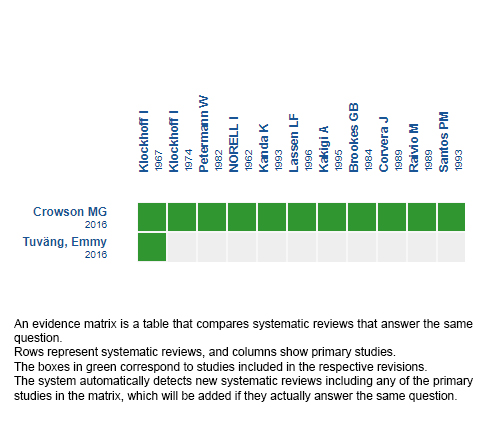Resúmenes Epistemonikos
← vista completaPublicado el 28 de marzo de 2018 | http://doi.org/10.5867/medwave.2018.02.7187
¿Son efectivos los diuréticos en la enfermedad de Ménière?
Are diuretics effective for Ménière`s disease?
Abstract
INTRODUCTION Ménière`s disease is an inner ear disorder characterized by episodes of spontaneous vertigo, fluctuating hearing loss and tinnitus. Diuretics have been widely used for the treatment of attacks, but there is controversy about their effectiveness.
METHODS To answer this question we used Epistemonikos, the largest database of systematic reviews in health, which is maintained by screening multiple information sources, including MEDLINE, EMBASE, Cochrane, among others. We extracted data from the systematic reviews, reanalyzed data of primary studies, conducted a meta-analysis and generated a summary of findings table using the GRADE approach.
RESULTS AND CONCLUSIONS We identified three systematic reviews including nineteen studies overall, of which four were randomized trials. We concluded it is not clear whether diuretics lead to a symptomatic improvement of vertigo or an objective decrease in hearing loss in patients with Ménière`s disease, because the certainty of the evidence is very low.
Problem
Ménière`s disease is an inner ear disorder characterized by episodes of spontaneous vertigo, fluctuating hearing loss and tinnitus. The American Academy of Otolaryngology and Head and Neck Surgery (AAO-HNS) has created guidelines to define the diagnosis, including two episodes of vertigo greater than 20 minutes, sensorineural hearing loss confirmed by audiometry, added to tinnitus or aural fullness [1]. However, these guidelines are not universally accepted. Pathophysiologically, Ménière`s disease is secondary to an increase in endolymphatic pressure in the inner ear, whose cause is idiopathic. The attacks of this disorder occur on average between 6 to 11 months per year [2].
The ideal treatment aims to reduce the number and severity of vertigo attacks, to reduce hearing loss and tinnitus associated with the attacks, to alleviate chronic symptoms and to prevent the progression of the disease in terms of hearing and balance. While no treatment has met all of these goals, diuretics are frequently used. Different diuretics act by different mechanisms, but all of them would reduce volume and pressure of endolymph, either by increasing clearance or decreasing production. Despite the above, there is controversy regarding the efficacy of this treatment in Ménière’s disease.
Methods
To answer the question, we used Epistemonikos, the largest database of systematic reviews in health, which is maintained by screening multiple information sources, including MEDLINE, EMBASE, Cochrane, among others, to identify systematic reviews and their included primary studies. We extracted data from the identified reviews and reanalyzed data from primary studies included in those reviews. With this information, we generated a structured summary denominated FRISBEE (Friendly Summary of Body of Evidence using Epistemonikos) using a pre-established format, which includes key messages, a summary of the body of evidence (presented as an evidence matrix in Epistemonikos), meta-analysis of the total of studies when it is possible, a summary of findings table following the GRADE approach and a table of other considerations for decision-making.
|
Key messages
|
About the body of evidence for this question
|
What is the evidence. |
We identified three systematic reviews [3],[4],[5] This table and the summary in general are based on the two relevant trials [15],[17], since the observational studies did not increase the certainty of the existing evidence or provide additional relevant information. |
|
What types of patients were included* |
Both trials used criteria different to AAO-HNS [1] to define Ménière´s disease [15],[17]. |
|
What types of interventions were included* |
The trials used hydrochlorothiazide at a dose of 25 mg every 8 hours [15] and hydrochlorothiazide plus triamterene (50 mg/ 25 mg) 2 capsules every 48 hours [17]. |
|
What types of outcomes |
The outcomes, according to how they were grouped in the identified systematic reviews, were:
|
* The information about primary studies is extracted from the systematic reviews identified, unless otherwise specified.
Summary of Findings
The information on the effects of diuretics for Ménière`s disease is based on two randomized trials involving 63 patients overall [15],[17].
Both trials reported symptomatic improvement in vertigo, changes in hearing loss and adverse effects. None of the identified reviews could conduct a meta-analysis of the identified trials. The summary of findings is the following:
- It is not clear whether the use of diuretics leads to a symptomatic improvement of vertigo in Ménière's disease, because the certainty of the evidence is very low.
- It is not clear whether the use of diuretics leads to an objective improvement of hearing loss in Ménière's disease, because the certainty of the evidence is very low.
- The use of diuretics in Ménière's disease is probably associated with minimal adverse effects. The certainty of the evidence is moderate.


Other considerations for decision-making
|
To whom this evidence does and does not apply |
|
| About the outcomes included in this summary |
|
| Balance between benefits and risks, and certainty of the evidence |
|
| Resource considerations |
|
| What would patients and their doctors think about this intervention |
|
|
Differences between this summary and other sources |
|
| Could this evidence change in the future? |
|
How we conducted this summary
Using automated and collaborative means, we compiled all the relevant evidence for the question of interest and we present it as a matrix of evidence.

Follow the link to access the interactive version: Diuretics for Ménière's disease
Notes
The upper portion of the matrix of evidence will display a warning of “new evidence” if new systematic reviews are published after the publication of this summary. Even though the project considers the periodical update of these summaries, users are invited to comment in Medwave or to contact the authors through email if they find new evidence and the summary should be updated earlier.
After creating an account in Epistemonikos, users will be able to save the matrixes and to receive automated notifications any time new evidence potentially relevant for the question appears.
This article is part of the Epistemonikos Evidence Synthesis project. It is elaborated with a pre-established methodology, following rigorous methodological standards and internal peer review process. Each of these articles corresponds to a summary, denominated FRISBEE (Friendly Summary of Body of Evidence using Epistemonikos), whose main objective is to synthesize the body of evidence for a specific question, with a friendly format to clinical professionals. Its main resources are based on the evidence matrix of Epistemonikos and analysis of results using GRADE methodology. Further details of the methods for developing this FRISBEE are described here (http://dx.doi.org/10.5867/medwave.2014.06.5997)
Epistemonikos foundation is a non-for-profit organization aiming to bring information closer to health decision-makers with technology. Its main development is Epistemonikos database (www.epistemonikos.org).
Potential conflicts of interest
The authors do not have relevant interests to declare.

